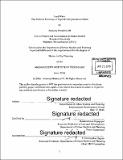Land wars : the political economy of Nigeria's displacement crisis
Author(s)
Medeiros, Anthony, III
DownloadFull printable version (5.895Mb)
Other Contributors
Massachusetts Institute of Technology. Department of Urban Studies and Planning.
Advisor
Balakrishnan Rajagopal.
Terms of use
Metadata
Show full item recordAbstract
"They were burning our houses in the night. We lost everything. Then the policeman came, and the people thought they were here for our security. Until they started shooting." - Resident of Ilu Birin, Lagos, Nigeria. Evicted to make room for a luxury high-rise. By all accounts, the world has entered a modern displacement crisis. Unprecedented millions have been uprooted from their homes by armed conflict, disaster, and land grabs. The traumatic impact of forced displacement is well documented. Yet the initial displacing event is typically only the beginning. Once displaced persons are forced out, they encounter a maze of institutional arrangements that will determine their fate. National and state borders, decades-old international conventions, land and property regimes, and the varied logics of humanitarian response all circumscribe the experience of displacement. These institutions govern assistance allocations, the prospects for legal redress, and even who lives and dies. With the stakes so high, we are compelled to ask: do these existing mechanisms correctly identify and protect the most vulnerable? In this thesis I examine Nigeria's forced migration epidemic as an illustrative case. Nigeria faces twin displacement crises. The Boko Haram insurgency in the northeast has displaced more than 2.3 million people, both internally and across national borders. Meanwhile, development projects have displaced another estimated 2 million. The conflictinduced migration is well-documented in secondary literature. This study complements it through fieldwork in ten communities displaced by development projects in Lagos, Port Harcourt, and Ogoniland. Victims of land grabs and forced evictions in Nigeria face violence, homelessness, joblessness, family separation, food insecurity, increased disease morbidity, and disruptions to children's education. Through a comparison of the institutional responses to this crisis, I interrogate existing displacement governance regimes, and begin to evaluate possible alternatives.
Description
Thesis: M.C.P., Massachusetts Institute of Technology, Department of Urban Studies and Planning, 2016. Cataloged from PDF version of thesis. Includes bibliographical references (pages 83-88).
Date issued
2016Department
Massachusetts Institute of Technology. Department of Urban Studies and PlanningPublisher
Massachusetts Institute of Technology
Keywords
Urban Studies and Planning.